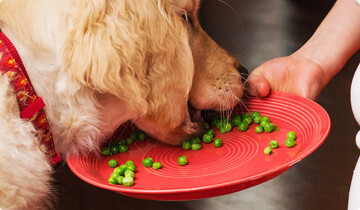Our fur babies sometimes eat things they shouldn’t. We dove into recent claims data to reveal the most common (and most expensive) food-related pet insurance claims, so you know what to watch out for.
Chocolate is the most commonly eaten food that may be related to toxicity, according to pet insurance claims data from 2021 and 2022.
Data showing insurance claims related to food and foreign body ingestion over recent years has revealed the five most common food-related claims.
- Chocolate
- Bones
- Raisins or grapes
- Corn cobs
- Peach stones
There were more than 2,800 claims relating to pets eating something they shouldn’t have between 1st July 2021 and 1st November 2022. 219 of these claims involved chocolate, but that’s not all our fur babies ate. There was a small number of claims relating to underwear including bra straps and boxer shorts and more than one pooch threw up a sock they’d snaffled!
From dishcloths to tennis balls, compost to rat bait, the unfortunate dining habits of some of New Zealand’s pets racked up some big bills.
One Golden Retriever needed extensive veterinary treatment after ingesting plastic. We paid out $15,000 for the treatments; this was the most expensive claim paid for a pet who’d eaten something they shouldn’t have in 2022.
Most common toxic or dangerous foods eaten by pets
Chocolate
Chocolate ingestion can cause serious illness in dogs and cats because it contains theobromine and caffeine. Both chemicals are diuretics, heart stimulants and muscle relaxants and because pets can’t metabolise theobromine and caffeine well, they are more sensitive to their effects. Dark chocolate is the most dangerous because it contains more theobromine than other types of chocolate.
This was the most common food-related claim, we paid out more than $82,000.
Bones
Bone ingestion was the second-most common food claim. Dogs were generally the unlucky ones in this category, with many becoming unwell or distressed after swallowing large pieces of bone or getting a bone shard lodged in their throat. On average, these claims were also some of the most expensive – more than half the claims relating to bones were over $1,000 and several were over $3,000.
Raisins or grapes
Raisins and grapes are also dangerous for curious pets. Like chocolate, raisins are a holiday season hazard, present in popular human treats like hot cross buns and traditional fruit cakes. There are specific toxins present in grapes and raisins that have been known to cause kidney failure in cats and dogs. Raisins generally carry an increased risk because the toxins have become concentrated. 72 pet parents insured with Southern Cross had to take their pet to the vet as a result of their pet eating grapes or raisins. The average claim paid was $610.
Corn cobs
Corn cob is another common food-related claim and it’s also one of the top four summer pet insurance claims. Be wary around the BBQ this year! While corn isn’t bad for your pet in small amounts, the cob can cause a serious intestinal blockage. If the cob doesn’t pass through your pet’s intestines naturally, it may need to be removed and this can lead to vital but costly surgery or treatment.
The average claim paid for corn cob ingestion was more than $1,300.
Peach stones
Though less common than other food-related claims, peaches still make it onto our list of common foods to watch out for if you have pets. The pet parents of one Miniature English Bull Terrier claimed $5,000 towards vet treatments after their dog swallowed a peach stone and suffered an obstruction. Peach stones are a recurring culprit of ‘foreign body obstruction’ pet health issues, possibly because their fresh, sweet taste is irresistible to some dogs. But other stone fruits and berries can be an issue too with avocados and karaka berries also listed in the data.
Tips
Prevention is best so try and keep those foods out of paws' reach. Our four-footed furry friends can be quite tricky and will help themselves given a chance. A lot of problems arise from raiding leftovers and food they shouldn’t eat from rubbish bags that they have tracked down with their noses. A good idea is to double bag your leftovers to minimise the smell. Always consult your veterinarian as soon as you think or realise your pet has eaten something they shouldn’t have and for peace of mind. Make a note of what you think they’ve eaten (bring the wrapper, if possible) and when you think they ate it.
References
Southern Cross Pet Insurance ingestion and poisoning related claims data November 2022
Foods you cat should never eat, Pets Web MD, accessed November 2022
https://pets.webmd.com/cats/ss/slideshow-foods-your-cat-should-never-eat
Chocolate poisoning in dogs, VCA Hospitals, accessed November 2022
https://vcahospitals.com/know-your-pet/chocolate-poisoning-in-dogs
Grape and raisin toxicity in dogs, Katrina McKnight, ASPCA Animal Poison Control Centre, accessed November 2022
https://www.aspcapro.org/sites/default/files/q.pdf



